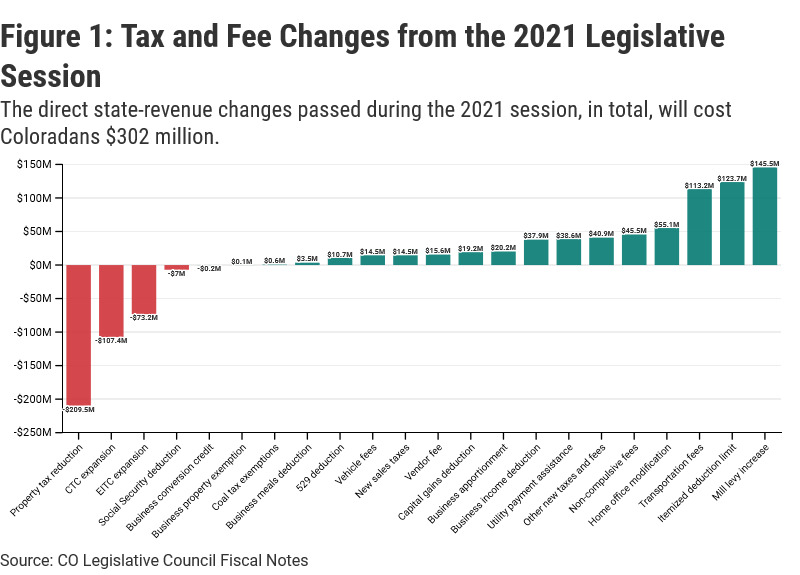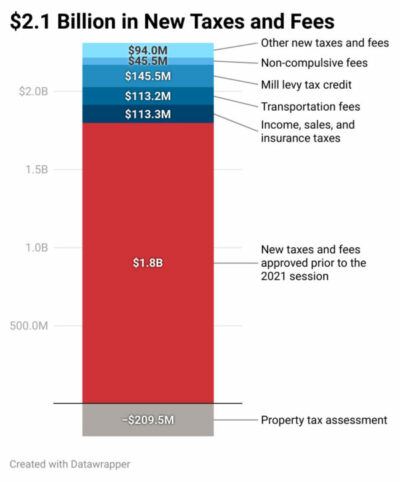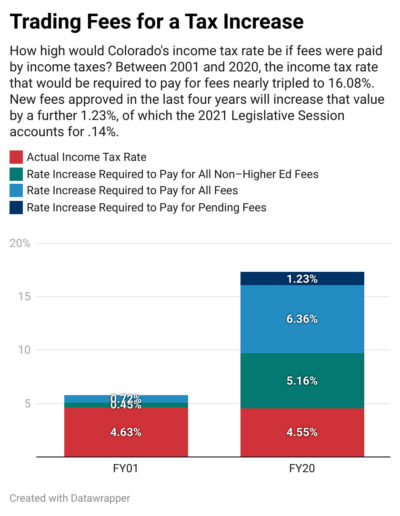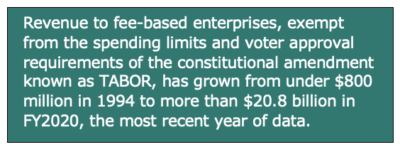Introduction
Despite tax revenue to the state’s General Fund rebounding to more than $2 billion above pre-pandemic levels[i] and a surge of more than $65 billion in federal funds to Colorado, the 2021 legislative session, which ended June 8th, resulted in an additional net tax burden of $302 million (in FY23) on individuals and businesses. New fee-based revenue from the 2021 session is projected to be over $255 million annually. This figure is relevant to two ballot measures passed in 2020.
- These revenues more than offset the .08 percentage reduction in the state income tax just approved by voters last year under Proposition 116; raising $255 million through the state income tax would require a rate increase of .14 percentage points. As shown by Figure 3, the state income tax rate would need to increase by 1.23 percentage points to raise the same amount of revenue ($2.2 billion[1]) that pending fees from the last four years are projected to raise.
- In addition, each of the 6 new enterprises created during the 2021 session are estimated to generate less than $100 million individually over their first five years. This evades the need for approval by Colorado voters which 2020 Proposition 117 now requires.
Overall, the 2021 legislative session resulted in an additional $699 million dollars in new taxes and fees, but, through both an increase in income tax deductions and a temporary 2-year property tax cut, there is also a projected $397 million in tax cuts in FY23.

Direct Taxes and Fees are Just the Tip of the Iceberg of New Costs
New net direct costs, which will exceed $2.1 billion in 2023, comprise only part of the financial burden facing Coloradans and Colorado businesses—they do not include the indirect costs of numerous new laws and regulations. While the impact of each new regulation has not been fully valued yet, efforts to comply with them will cost many individuals and businesses billions of dollars in total, likely even more than the $2.1 billion in direct costs. Though any single new regulation may not change the outcome of a firm’s decision to expand in Colorado or to relocate to our state, at some point the cumulative regulatory burden could.
The full cost of each piece of legislation is not quantified, but here is a summary of some of the most impactful changes:
- Through HB-1232, Colorado’s healthcare sector now faces the mandate to implement a new standardized health insurance plan with benefits yet to be determined at prices 15% below current rates.
- Owners and operators of large commercial buildings and their tenants will have to navigate the costs associated with forcing large reductions in energy use imposed by HB-1286.
- More regulatory authorizations were granted to the Air Quality Control Commission (AQCC), through HB-1266, even as major regulations authorized in previous legislation are working their way through the formal rulemaking process.
- According to a recent state cost/benefit analysis, the pending “Employee Trip Reduction Program” regulation before the AQCC is estimated to cost up to $350 million annually and provide a benefit of $34 million based on the social cost of carbon applied to estimated emission reductions.
- Several recent regulations are together estimated to cost the oil and gas industry at least $200 million annually according to aggregation of state public reports by COGA.
- Colorado recently made national headlines as large national companies now explicitly omit Colorado applicants from their remote work job postings due to a recently enacted law requiring pay disclosures for new postings.
While the Colorado economy has yet to fully recover from the economic shocks throughout the pandemic, each new tax, fee and regulatory cost will not only challenge the ability to fully recover the employment lost, but also the ability for Colorado to remain competitive in the future.
New Taxes and Fees Will Increase by Over $2.1 Billion

The increase in taxes and fees during the 2021 legislative session is only the latest in a series of new taxes and fees enacted during the last few years. In March 2021, CSI released “Colorado’s Competitiveness: The Challenge of Economic Recovery under More than $1.8 Billion in New Regulations, Taxes and Fees,” which detailed the many tax and fee increases new to Colorado since 2018. The research found that, in total, individuals and businesses are expected to pay approximately $1.8 billion more in taxes and fees over the next few years as a result of recently passed policies. Taxes paid by businesses to the Unemployment Insurance Trust Fund annually, for example, are expected to increase by more than $500 million within the next two years to pay off the more than $1 billion in federal loans and to replenish the fund. Under the additional impact of this year’s legislative action, the total net direct cost of rules and legislation passed since 2018 is now over $2.1 billion.

- 6 new enterprises were created during the 2021 legislative session, which is a 25% increase from the 24 enterprises in 2020.
- New fees are estimated to increase by $2.2 billion due to changes from the last four years.
- Colorado’s personal income tax would need to increase by 1.23% if the state were to raise the $2.2 billion in pending fees from income taxes instead.

Breakdown of Direct and Indirect Cost Measures
Direct Annual Costs of New Tax and Fee Proposals Passed during the 2021 Legislative Session: $699 Million in New Taxes and Fees and $397 Million in Tax Cuts
- Income Tax – HB21-1311: $27.3[ii] million (net)[iii]
- This ends and limits several existing tax deductions, such as by capping itemized deductions for high earners, capping deductions for contributions to college savings accounts, and adding some new federal deductions to businesses’ taxable incomes. The value of these tax increases together is $215.2 million.
- This also lowers taxes by expanding the Earned Income Tax Credit (EITC) and funding the Child Tax Credit (CTC), repeals a cap on social security deductions, and grants a tax credit to worker-owned businesses. The value of these tax cuts together is approximately $187.8 million in FY23.
- The tax increases, especially the itemized deduction cap and the qualified business income deduction rollback, will mostly affect businesses and wealthy individuals. The changes to the EITC and the CTC will lower taxes for low-income people almost exclusively.
- Insurance Premium Property Sales Severance Tax – HB21-1312: $86[2] million[iv]
- This applies sales tax to digital goods, eliminates the vendor fee for large retailers, narrows tax exemptions for some business activities, and restricts businesses’ home office rules.
- The bill also changes some property taxes and limits oil-and-gas netback deductions, but the impacts of these are unknown.
- Individuals at most income levels would pay additional taxes on purchases of digital goods. Businesses would be affected by the new home office rules and the vendor fee repeal. Most of the revenue raised by this bill would be paid by businesses.
- Total Program Mill Levy Tax Credit – HB21-1164: $145.5 million[v]
- This requires the Colorado Department Education to phase out property tax mill levy tax credits implemented as a result of legislation in 2020. The property tax revenue collected, which will increase to $288 million annually upon full implementation, will go to school districts.
- Sustainability of the Transportation System – SB21-260: $113.2 million[vi]
- This adds many new fee enterprises on transportation activities such as vehicle registration, ride-sharing, and retail deliveries, many of which are set to grow considerably over time. The complete value of the revenue raised over the whole course of this bill is estimated to be $3.8 billion. Retail businesses and frequent commuters will be especially impacted.
- New Non-compulsive Fees: $45.5 million
- Many small new fees were approved during the 2021 session which fund various non-compulsory programs, including alcohol delivery and take-out licenses for restaurants and the optional issuance of state park passes upon vehicle registration.
- Other New Taxes and Fees: $94 million
- Many small new fees were approved during the 2021 session which fund various compulsory programs, like a new suicide prevention hotline funded by all cellular service customers, or increase fees paid to existing sources, like the Highway Users Tax Fund.
- Property Tax Classification and Assessment Rates – SB21-293: -$209.5 million[vii]
- This bill temporarily reduces property tax assessment rates for residential property, agricultural property, and property used for renewable energy production.
Direct Costs of Bills, Ballot Measures, and Laws Passed between 2018 and 2020: $1.8 Billion
Indirect Costs of Recent Laws and Regulations:
2021 Legislative Session:
- HB21-1266 – Environmental Justice Disproportionate Impacted Community[viii],[ix]
- This bill creates a fee on greenhouse gas emissions and establishes additional environmental requirements for utilities.
- Besides the $3.1 million raised by the new fee directly, this bill could lead to the imposition of large compliance costs of the rules “concerning the development of a state agency-wide environmental justice strategy and a plan to implement that strategy” it directs the Air Quality Control Commission to develop.
- HB21-1232 – Standardized Health Benefit Plan Colorado Option[x]
- This, legislators’ third attempt to pass a “public option” bill, sets ambitious health insurance premium-reduction targets and low new hospital reimbursement rates.
- According to CSI’s modeling, this will cost Colorado’s medical sector $700.8–$876 million in lost 2025 revenue. Some individuals will save money on health insurance, but the economy will still endure job and GDP losses.
- SB21-175 – Prescription Drug Affordability Review Board[xi]
- This establishes a state entity assembled to impose caps upon some drug prices.
- Depending upon the details of the price caps, there could be both cost savings for some individuals and large revenue losses for drug companies.
- SB21-087 – Agricultural Workers' Rights[xii]
- This bill repeals several labor-law exemptions for agricultural businesses.
- The agriculture industry has historically been exempted from many labor laws because of its unique attributes. Revoking its exemptions will cause (especially small) producers to change their employment practices in expensive ways. This bill may put Colorado agriculture at a significant competitive disadvantage and cause the sector economic harm.
- HB21-1286 – Energy Performance for Buildings[xiii]
- This creates a large-building energy benchmarking program which includes requirements that owners of buildings with gross floor area larger than 50,000 ft2 meet various environmental performance standards.
- Many building owners will be forced to either purchase expensive equipment upgrades, reduce the commercial utilization of their buildings, or pay large non-compliance fines.
Laws Passed since 2019 that Authorized Present or Pending Regulations:
- HB19-1261 – Climate Action Plan to Reduce Pollution[xiv]
This bill set in motion a decades-long rulemaking process which has produced many regulations, including the following:
- AQCC Zero Emission Vehicle Mandate
- This establishes rules regarding the sale of electric vehicles and the electric infrastructure required to support a large electric vehicle stock.
- Electric utility companies will bear the costs of vastly increasing their capacities in accordance with the rules, and the state will have to raise revenue to fund subsidies of electric vehicle charging stations.
- AQCC Employee Traffic Reduction Program
- This includes rules meant to limit single-occupancy vehicle trips by Colorado employees.
- A state cost-benefit analysis concluded that the cost of this program to employers will be between $19.9 and $350.6 million, notwithstanding the effects of exemptions which could drive costs down.
- Utility Emissions-reduction Requirements
- Electric utilities in Colorado are required to reduce their emissions by 80% by 2030.
- Electric prices are likely to rise due to the investments, expansions, upgrades, and peak-demand shifts required of utility companies to reach the target.
There are many more regulations yet to come as a result of HB19-1261.
- SB20-205 – Sick Leave for Employees[xv]
- This bill requires employers to provide at least 48 hours of paid sick leave to employees.
- Employers will incur the costs of lost labor and/or replacement labor. In March 2020, sick leave compensation cost employers an average of $.45 per hour worked.
- Proposition 118 (2020) – Paid Family and Medical Leave[xvi]
- This voter-approved ballot measure will create a paid family and medical leave program available compulsorily to employees of eligible businesses.
- The program will be funded by earnings premiums, totaling $1,294.9 million in 2023, paid by employers and employees. The program’s generous benefits will cost employers either in productivity or the price of securing replacement labor.
- SB19-085 – Equal Pay for Equal Work Act (Effective Jan. 1st, 2021)[xvii]
- This bill sets several new wage disclosure and discrimination rules meant to reduce pay disparities.
- Its wage disclosure rules are compelling businesses to exclude Coloradans from consideration for some remote jobs. As of July 9th, 134 companies have posted job listings which explicitly preclude applicants in Colorado from applying. Penalties for rules violations range from $500 to $10,000.
- SB19-181 – Protect Public Welfare Oil and Gas Operations[xviii],[xix]
- This authorized many new oil-and-gas restrictions. The resultant regulations include the increased drilling setback requirements established during the COGCC October, 2020, rulemaking.
- The fiscal note estimates $3,000,000 to be raised by higher permitting fees, but this does not account for any impacts of the new rules upon oil-and-gas production. As of February 2021, very few new drilling permits have been filed because of the new setback rules. COGA conservatively estimates that the regulatory changes which have precipitated from this bill’s passage and some other regulations have cost the industry more than $200 million.
- HB19-1210 – Local Government Minimum Wage[xx]
- This bill ended Colorado’s prohibition of local minimum wages which differ from the state’s minimum.
- Businesses of localities wherein higher minimum wages are established incur higher operating costs and may be forced to either decrease productivity or fire employees.
- HB19-1231 – New Appliance Energy and Water Efficiency Standards[xxi]
- This requires appliances and plumbing fixtures sold within Colorado to adhere to higher standards of resource-efficiency.
- Standards-compliant appliances are surely more expensive than others; otherwise, there would hardly be a need for this law.
- HB20-1158 – Insurance Cover Infertility Diagnosis Treatment Preserve[xxii]
- This bill requires all health insurance plans in Colorado to cover some types of infertility treatment by 2022.
- This will necessarily drive health insurance prices up due to the additional risk which insurance companies will assume in order to cover treatments which they previously did not.
End Notes
[1] Total new fees ($2.2B) is higher than total NET new taxes and fees ($2.1B) as there are several tax revenue reductions that partially offset the increase in fees.
[2] The fiscal note has not yet been updated similarly, but this number reflects that the annuities adjustment, worth $59.3 million of state revenue according to the May 25th estimate, was removed by a Senate amendment.
[i] https://leg.colorado.gov/sites/default/files/images/junforecast.pdf
[ii] The cap on tax-deductible contributions to college savings accounts was raised from $10,000 to $30,000 since the release of the May 25th fiscal note. This change lowers the net revenue effect of the bill by up to $10.7 million, but the state has not yet estimated its actual value.
[iii] https://leg.colorado.gov/sites/default/files/documents/2021A/bills/fn/2021a_hb1311_r1.pdf
[iv] https://leg.colorado.gov/sites/default/files/documents/2021A/bills/fn/2021a_hb1312_00.pdf
[v] https://commonsenseinstituteco.org/trying-to-fix-a-broken-education-finance-system/
[vi] https://leg.colorado.gov/sites/default/files/documents/2021A/bills/fn/2021a_sb260_r1.pdf
[vii] https://leg.colorado.gov/sites/default/files/documents/2021A/bills/fn/2021a_sb293_r2.pdf
[viii] http://leg.colorado.gov/sites/default/files/documents/2021A/bills/fn/2021a_hb1266_r2.pdf
[ix] http://leg.colorado.gov/sites/default/files/documents/2021A/bills/2021a_1266_enr.pdf
[x] https://leg.colorado.gov/sites/default/files/2021a_1232_signed.pdf
[xi] https://leg.colorado.gov/sites/default/files/2021a_175_signed.pdf
[xii] https://leg.colorado.gov/sites/default/files/2021a_087_signed.pdf
[xiii] https://leg.colorado.gov/sites/default/files/2021a_1286_signed.pdf
[xiv] https://leg.colorado.gov/sites/default/files/2019a_1261_signed.pdf
[xv] https://leg.colorado.gov/sites/default/files/2020a_205_signed.pdf
[xvi] https://commonsenseinstituteco.org/proposition-118-a-statewide-paid-family-and-medical-leave-program-for-colorado-but-at-what-cost/
[xvii] https://leg.colorado.gov/sites/default/files/2019a_085_signed.pdf
[xviii] https://leg.colorado.gov/sites/default/files/2019a_181_signed.pdf
[xix] https://www.coga.org/factsheets/regulatory-costs
[xx] https://leg.colorado.gov/sites/default/files/2019a_1210_signed.pdf
[xxi] https://leg.colorado.gov/sites/default/files/2019a_1231_signed.pdf
[xxii] https://leg.colorado.gov/sites/default/files/2020a_1158_signed.pdf